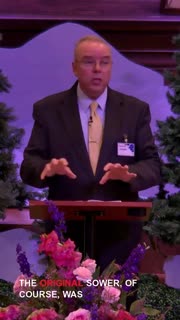Receptive Hearts: Nurturing the Word for Fruitfulness
Devotional
Sermon Summary
Bible Study Guide
Sermon Clips
### Quotes for Outreach
1. "Our Lord Jesus was a storyteller, as you know. He shared truth through relatable kinds of stories. And one of His best-known stories goes a little like this. It's about a farmer who went out in his field to sow one day, tossing his seed out. Some of it fell on hard ground, it was stolen away by the birds. Other seed fell on the rocks, the soil was shallow, it sprung up, but the sun came out and it withered. Other seed was choked out by weeds and that sort of thing. But some seed fell on good soil and bore fruit, a little or a lot." [01:49] (49 seconds)
2. "The original sower, of course, was Jesus, because the seed is the word. And so Jesus is the one, who sows the seed. It's His followers who sow the seed now. That's you. That's me. We sow the seed on His behalf. And what is sown, that seed, as I said, is the word. In Matthew's Gospel, it's called the word of the kingdom. In Luke, it's called the word of God. It's the teachings of God. It's the gospel of Jesus Christ. It's the good news. It is the word." [05:01] (36 seconds)
3. "I think it's clear that our loving Lord wants His message shared with everyone. Anyone who is willing to hear. Not just those in the cultivated soil. Not just the ones that we think will respond. Although we certainly need to share the word with them as well. But everyone. Even those who will not receive it." [06:49] (25 seconds)
4. "The key to bearing fruit is the germination and the growth of the seed. And you can sit under the greatest biblical preaching of our generation, but if those words that you hear land on indifferent soil, there will be no fruit. No fruit will grow." [10:08] (22 seconds)
5. "For the word to grow in you and bear fruit, you'll have to invest some effort in tending the garden of your heart. Take what you hear and what you learn with you when you go. Meditate on it. Cultivate it. Study on it. Only then is it ever going to grow and bear fruit in your life." [11:36] (21 seconds)
### Quotes for Members
1. "The seed of the Word is scattered right here in this place every Sunday and Wednesday. This week it's going to be scattered around here every evening in Vacation Bible School. We scatter a lot of seed around here on other occasions in various ways, and it falls on the soil of your heart. But if you don't meditate on it, if you don't reflect on it, if you don't nurture it, it just sits there on top of the soil without an opportunity to take root. And consequently, a lot of it ends up being stolen away, never bearing the fruit of a Christ-like character in your life." [08:20] (41 seconds)
2. "A healthy, fruit-producing plant needs a stable root system to strengthen it, to hydrate it, to nourish the plant so it can grow and not wither. And the root system of a Christian is Jesus Himself. Our Lord is the one who nourishes us to grow into His image." [14:50] (23 seconds)
3. "The worries of this life are the lesser important things that captivate our attention and distract us from the more important things, from the essential things, the insignificant that draws our attention away from the significant. We give undue attention and worry to our business, our social life, our hobbies, our food, our clothing, even our children, our family, and too little, if any, attention and energy to the pursuit of the kingdom of God and the righteousness of God." [20:11] (33 seconds)
4. "The purpose of your life is to bear the fruit of the character of Christ. In Galatians chapter 5 we read a bit about that where it says the fruit of the spirit, God's spirit, the spirit of Christ is love, joy, peace, patience, kindness, goodness, faithfulness, gentleness, and self-control. That's the fruit of the character of Christ in your life. Do you see it there? Is it growing? Is that the fruit that's coming from your experience?" [26:34] (36 seconds)
5. "If you are diligent to hear the word and cultivate it to avoid having it stolen away, to nurture it by faith in order to develop a root system that can withstand the rays of the sun and keep it in the house as the priority of your life in order to avoid the distractions all around you, then you will bear fruit. And the extent to which you're able to do these things will determine the return on your harvest 30 fold, 60 fold, even a hundred fold." [24:46] (35 seconds)
Ask a question about this sermon
1. "Our Lord Jesus was a storyteller, as you know. He shared truth through relatable kinds of stories. And one of His best-known stories goes a little like this. It's about a farmer who went out in his field to sow one day, tossing his seed out. Some of it fell on hard ground, it was stolen away by the birds. Other seed fell on the rocks, the soil was shallow, it sprung up, but the sun came out and it withered. Other seed was choked out by weeds and that sort of thing. But some seed fell on good soil and bore fruit, a little or a lot." [01:49] (49 seconds)
2. "The original sower, of course, was Jesus, because the seed is the word. And so Jesus is the one, who sows the seed. It's His followers who sow the seed now. That's you. That's me. We sow the seed on His behalf. And what is sown, that seed, as I said, is the word. In Matthew's Gospel, it's called the word of the kingdom. In Luke, it's called the word of God. It's the teachings of God. It's the gospel of Jesus Christ. It's the good news. It is the word." [05:01] (36 seconds)
3. "I think it's clear that our loving Lord wants His message shared with everyone. Anyone who is willing to hear. Not just those in the cultivated soil. Not just the ones that we think will respond. Although we certainly need to share the word with them as well. But everyone. Even those who will not receive it." [06:49] (25 seconds)
4. "The key to bearing fruit is the germination and the growth of the seed. And you can sit under the greatest biblical preaching of our generation, but if those words that you hear land on indifferent soil, there will be no fruit. No fruit will grow." [10:08] (22 seconds)
5. "For the word to grow in you and bear fruit, you'll have to invest some effort in tending the garden of your heart. Take what you hear and what you learn with you when you go. Meditate on it. Cultivate it. Study on it. Only then is it ever going to grow and bear fruit in your life." [11:36] (21 seconds)
### Quotes for Members
1. "The seed of the Word is scattered right here in this place every Sunday and Wednesday. This week it's going to be scattered around here every evening in Vacation Bible School. We scatter a lot of seed around here on other occasions in various ways, and it falls on the soil of your heart. But if you don't meditate on it, if you don't reflect on it, if you don't nurture it, it just sits there on top of the soil without an opportunity to take root. And consequently, a lot of it ends up being stolen away, never bearing the fruit of a Christ-like character in your life." [08:20] (41 seconds)
2. "A healthy, fruit-producing plant needs a stable root system to strengthen it, to hydrate it, to nourish the plant so it can grow and not wither. And the root system of a Christian is Jesus Himself. Our Lord is the one who nourishes us to grow into His image." [14:50] (23 seconds)
3. "The worries of this life are the lesser important things that captivate our attention and distract us from the more important things, from the essential things, the insignificant that draws our attention away from the significant. We give undue attention and worry to our business, our social life, our hobbies, our food, our clothing, even our children, our family, and too little, if any, attention and energy to the pursuit of the kingdom of God and the righteousness of God." [20:11] (33 seconds)
4. "The purpose of your life is to bear the fruit of the character of Christ. In Galatians chapter 5 we read a bit about that where it says the fruit of the spirit, God's spirit, the spirit of Christ is love, joy, peace, patience, kindness, goodness, faithfulness, gentleness, and self-control. That's the fruit of the character of Christ in your life. Do you see it there? Is it growing? Is that the fruit that's coming from your experience?" [26:34] (36 seconds)
5. "If you are diligent to hear the word and cultivate it to avoid having it stolen away, to nurture it by faith in order to develop a root system that can withstand the rays of the sun and keep it in the house as the priority of your life in order to avoid the distractions all around you, then you will bear fruit. And the extent to which you're able to do these things will determine the return on your harvest 30 fold, 60 fold, even a hundred fold." [24:46] (35 seconds)










